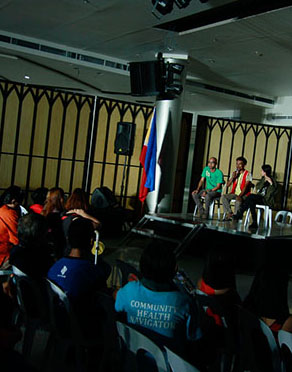Words by Stephen J Pedroza | Photos by Anthony Jacob Karagdag
Addressing environmental issues starts with raising the awareness among sectors. To this end, the Development Communication department of Xavier University showcased the 1st Kinaiyahan Film Festival on January 20-22 at the Lim Ket Kai Center.
“It is no accident that Xavier University is supporting programs like VEST (Valuing Ecosystem Services Together) and this festival which celebrates the care for the environment as what we will see in the documentaries,” said XU president Fr Roberto “Bobby” C Yap SJ in his speech during the opening ceremony.
VEST is an offshoot campaign for the Payment for Ecosystem Services (PES) encouraging people’s participation in a “rewarding mechanism” for Mt Kalatungan and a paradigm shift to prevent another catastrophe from inflicting Northern Mindanao.

A roster of 11 short documentaries by DevCom students were screened in the 3-day event, and in collaboration with the Rural Missionaries of the Philippines – Northern Mindanao Sub-Region (RMP-NMR), the festival featured the award-winning filmmaker Gabriela Krista “Kiri” Lluch Dalena.
“I brought my students to Miarayon and each group has a theme to deal with for their documentary,” recounted Evans Yonson, VEST social marketing supervisor.
Yonson, who is also a DevCom professor, introduced his class to the Miarayon-Lapok-Lirongan-Tinaytayan Tribal Association (MILALITTRA) in Talakag, Bukidnon as part of their film subject and immersed the students to local environmental challenges.
“We encourage everyone to take part in VEST because it promotes an inclusive care for the environment, especially here in Mindanao.”
VEST has targeted five sectors to participate or “inVEST” in this ecological undertaking, namely, the corporations, cooperatives, the academe, religious groups and the households.
Dr Hilly Ann Roa-Quiaoit, VEST research team leader, also explained how the upstream ecosystem affects the low-lying CDO due to its topography while City Mayor Oscar Moreno underscored in his message the essence of cooperation and “bayanihan” in preserving and protecting our natural resources.
A prized asset from Mindanao
Another highlight of the Kinaiyahan festival was the screening of Dalena’s “Gikan sa Ngitngit nga Kinailadman” (From the Dark Depths), a documentary film chronicling the struggles and hope of the lumad community in San Fernando, Bukidnon.
GNK also tackles the journey of peasant land rights defenders, and the destructive industries affecting their lands, farming activities and the environment.
“When you think of human rights violations … they are connected, closely related to environmental issues, and vice versa,” Kiri said, who is also a co-founder of the Southern Tagalog Exposure collective in 2001.
Her other documentary films include “Alingawngaw ng Punglo” (Echo of Bullets) and “Red Saga” inspired by an essay with the same title by the late artist and poet Maningning Miclat.
Kiri finished a bachelor’s degree in Human Ecology at UP Los Baños before enrolling at the Mowelfund Film Institute. In 2000, she worked as a cinematographer for “Palugid” (Margin) directed by Paolo Villaluna which won an Urian.
Kiri’s mother Julia Lluch (who is a sculptor) comes from Iligan City, Lanao del Norte. Kiri took her high school in her mother’s hometown and she speaks a great deal of Bisaya.
***
Short documentaries from emerging filmmakers
Here are the synopses of the short documentary films produced by DevCom students. You can access the trailers here: https://www.youtube.com/user/VESTogether.
Miarayon: Convergence of Culture and Religion speaks of how Christianity influences a Talaandig community that is faithful to their values and indigenous traditions.
Unang Yakap (First Hug) depicts how mothers handle their maternal health in Miarayon, Talakag, Bukidnon—where access to basic health services remains a scarce.
Kahimulugan showcases the opposing realities of education in CDO and in Miarayon, Bukidnon.
Calla of Miarayon demonstrates the journey of calla lily farmers from planting to selling them to CDO.
Tubig (Water) shows how the water is vital to our lives and why it can be a danger at the same time.
Katubayan at the Heart of the Steep Slope features the people of Miarayon who have remained determined and dedicated to their community, to their youth and education.
Ang Forest Guard og ang Kalasangan (The Forest Guard and the Forest) depicts the state of Mt Kalatungan in the province of Bukidnon and the role it plays for CDO's water resources.
Simhot (Sniff) follows a life of a rugby boy who has been sniffing a particular inhalant since he was a kid until he has his own family.
Banay sa Miarayon (A Family in Miarayon) chronicles the life of a simple family in Miarayon, Bukidnon.
Money Matters documents the struggles of a minimum wage earner from a remote community.
Not Another Sendong showcases how preventing another tragedy to happen needs a multi-sectoral cooperation.